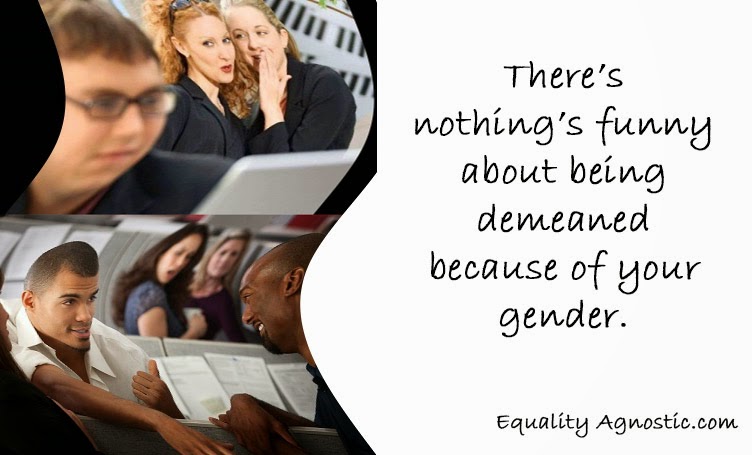From time to time, I’m accused of being funny (not here though). When I’m not blogging, I write inappropriate comedy/drama novels on topics that occasionally offend the hell out of people, which is why I smiled when I received a letter asking for my thoughts on sexist humour.
Comedy is an amazing tool that can be used to push boundaries, to start discussion when a topic is given more reverence than it deserves and when our silence is part of the problem. I think that it’s ok to be off-colour, even cringe-worthy when tackling difficult topics because sometimes that’s the only way we can start a discussion that must be had. There are ways that gender-based humour can be used to start those kinds of discussions, but rarely is that how it’s been used.
In the 1950’s it was impossible to turn on the TV without finding hapless-female-punchlines looking to be saved, exploited or controlled by male saviours, all in the name of cheap laughs. I remember watching reruns of “I love Lucy” as a child and being horrified—what women acted this way?
65 years later and you can’t turn on a family sitcom or even the average laundry detergent advertisement without finding idiotic, hapless men, presented as overgrown children incapable of looking after themselves without the ‘gracious’ management of over-indulgent, ever-patient women (eg Malcolm in the Middle, Everybody loves Raymond). I’m not saying sexist humour against women is dead, but it certainly isn’t commercially condonedin the way it used to be.
Feminists have worked tirelessly to create awareness that sexist jokes against women are demeaning, and they’re succeeding at getting that message heard. Unfortunately people aren’t hearing the true crux of that message which is “jokes that target gender are demeaning.” In the words of Warren Farrell: “In the past quarter century, we exposed biases against other races and called it racism, and we exposed biases against women and called it sexism. Biases against men we call humour.”
What started as an attempt to be more politically correct and level the comedic playing field, has turned into men becoming the new ‘safe’ derogatory punchline all in the name of equality (case in point). But why does it matter? Let me give you the the feminist perspective, which I’ve merely rearticulated to represent anyone of any gender.
Derogatory gender humour helps foster prejudice against the gender it demeans—that joke is the humour equivalent of a gateway drug. Sure it may seem harmless, but by telling jokes that demean a person because of their gender, you are essentially lowering inhibitions around the promotion of genderist attitudes, behaviours and treatments, while also enforcing gender stereotypes.
So unless your goal is to promote that kind of thing, I’d like you ask yourself one question each time you think about forwarding a joke that belittles either sex or promotes a gender based stereotype:
How would I feel if this joke was specifically about me or someone I cared about?
Gender is one of the central concepts of each person’s identity, when you belittle a person’s gender you are making a direct commentary on who that person is and how they see themselves.
I think we can all agree, there’s nothing funny about being demeaned.
These are two examples of the things that float my way thanks to Facebook – how would you feel if any of these were specifically about you?
Got a question on a gender issue or gender-equality? Is there an issue you’d like me to raise awareness on? Send me a message on the Facebook Equality Agnostic page and let me know.

